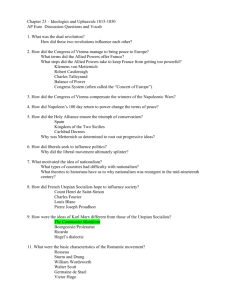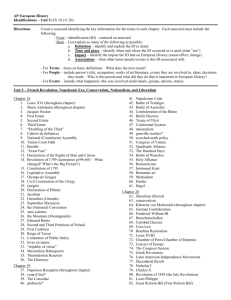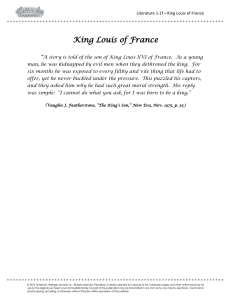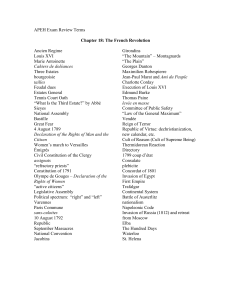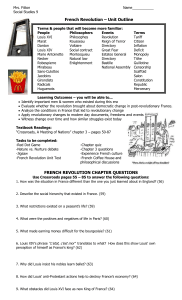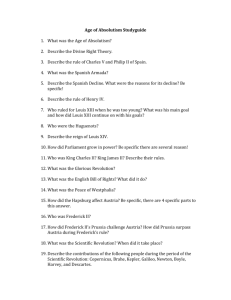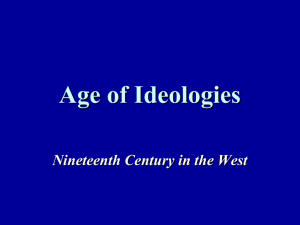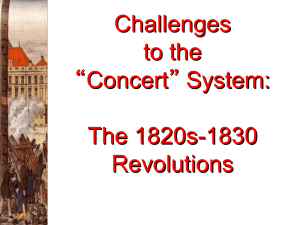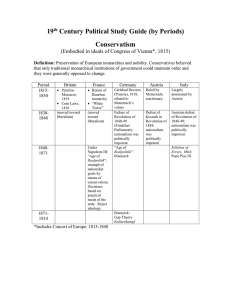Conservatism, Liberalism, Romanticism and Nationalism
advertisement
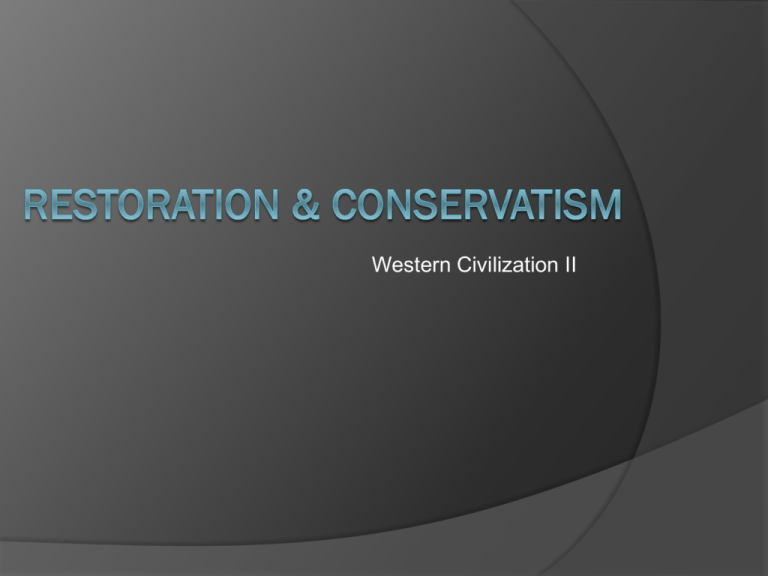
Western Civilization II Philosophical Conservatism Not rejection of all change, but reaction to violent upheaval of revolution Believed in evolution – building on the best traditions Edmund Burke opposed French Revolution because it threw away tradition and culture Edmund Burke Religious Conservatism Particularly resented Jacobin attempt to destroy Church Joseph de Maistre championed papal supremacy (ultramontanism) Argued religion, not science, was true civilizing force Joseph de Maistre Political Conservatism Power & privileges of aristocracy are necessary for social harmony Aristocracy defined as rule of the best Aristocrats had necessary experience & education Scoffed at idea of “natural rights” and abstract theories of government Institutions evolve over time to meet particular needs of a society Must be based on history & national character (volkgeist) The Concert of Europe Congress of Vienna (1814-15) est. principles of legitimacy & maintaining the balance of power Netherlands, Prussia & Piedmont- Sardinia strengthened as buffers against France Concert of Europe: Great Powers agreed to meet periodically to maintain the balance of power Great Britain dropped out in 1822 because unwilling to put down liberal revolutions in Italy & Spain Holy Alliance: France, Austria, Prussia & Russia Wanted to undo revolutions in Spanish Klemens von Metternich American colonies, but blocked by Britain & U.S. (Monroe Doctrine) ©2004 Wadsworth, a division of Thomson Learning, Inc. Thomson Learning™ is a trademark used herein under license. Europe after 1815 Latin American Revolutions Conservatism in Practice: France Louis XVIII (1814-1824): “L’union et l’oublie” Kept Concordat & Code Civil Charter had bicameral legislature, but suffrage limited to wealthiest 100,000 King Louis XVIII Charles X (1824-1830): “Le trone et l’autel” Tried to replace individualism with medieval corporatism Law of Sacrilege made tampering with the Host a capital crime Dismissed liberal Chamber of Deputies in March 1830 & issued drastic July Ordinances censoring press King Charles X The July Revolution (1830) The July Monarchy July Revolution of 1830 placed Louis Philippe, Duke of Orleans, on the throne Called the “Citizen King” Wore business suits & hats Tried to recreate the liberal constitutional monarchy of 1789-1792 Repudiated ultramontanism & corporatism Suffrage only doubled to 200,000 Francois Guizot stabilized economy, 1840-47 King Louis Philippe The Revolution of 1848 Economic depression & foolish attempts to suppress dissent led to revolt in Feb. 1848 End of Socialist Louis Blanc’s National Workshops sparked June Days uprising Brutally suppressed by Cavaignac Liberty Constitution of 1848 created unicameral legislature & president elected by universal male suffrage The Second Republic Dec. 1848 presidential election was landslide win for Louis Napoleon Bonaparte Monarchists in legislature divided between the Legitimists and Orleanists Dec. 2, 1851 coup d’état extended presidential term to 10 years & reduced legislature’s power Dec. 1852 – Emperor Napoleon III crowned Louis Napoleon Bonaparte
